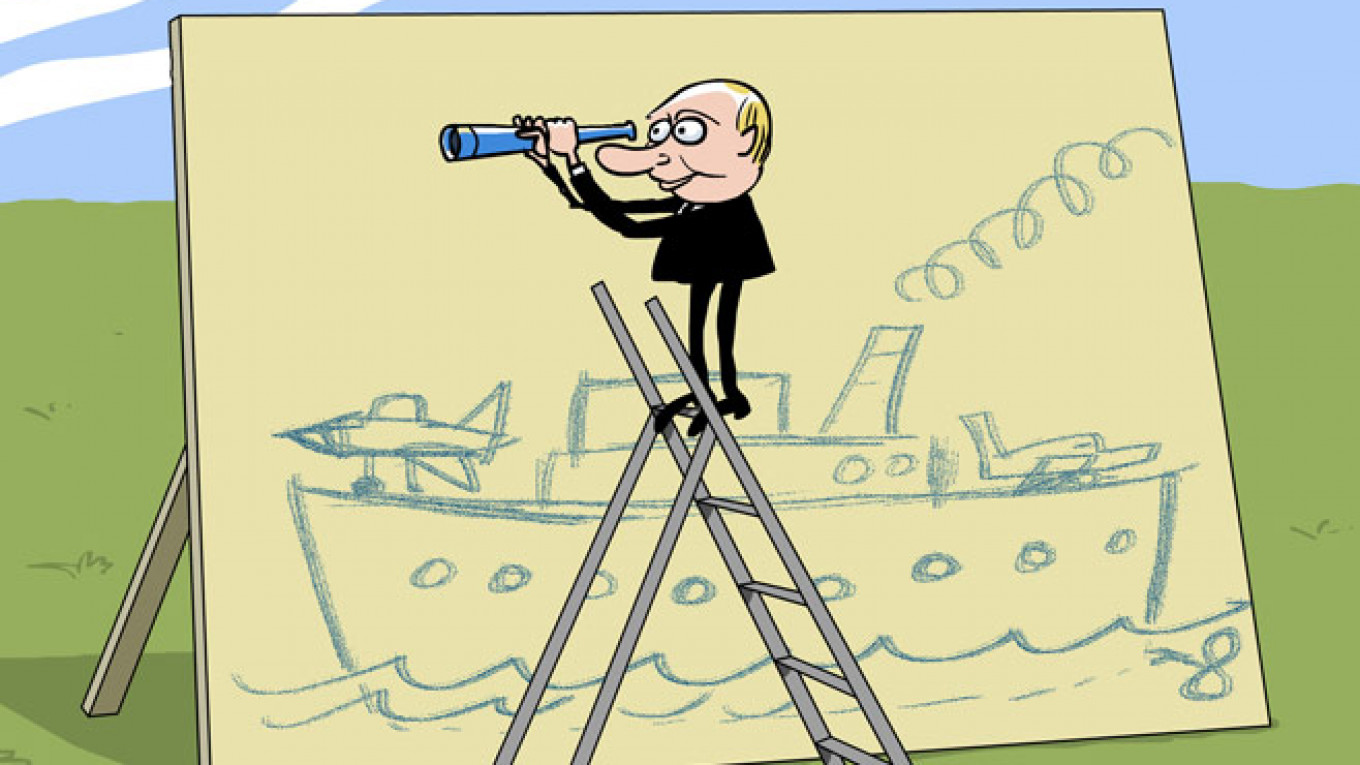As expected, initial negotiations broke down over the question of how much France should compensate Russia for canceling delivery of two Mistral helicopter carrier ships after this country annexed Crimea. Moscow stated that the offer from Paris was totally unacceptable.
A short time later, the head of shipbuilding for the Russian Navy, Captain Vladimir Tryapichnikov reported that "our military-industrial complex is fully capable of building such a ship. We are now designing a new type of large amphibious assault ship. It is taking shape in the final stage." Of course, that begs the question of why Moscow bothered ordering the Mistral if Russia's defense industry is so highly capable.
Every sailor knows that some ships bring nothing but trouble from the moment they hit water. For Russia, the Mistral has been one such vessel.
Just ask Oleg Bochkarev, Military-Industrial Commission deputy chairman. Only the devil knows what prompted him to speculate to reporters about the ill-fated Mistral during a conference titled "Information technology in the service of the military-industrial complex" held in Tatarstan last month. When asked about the fate of the helicopter carrier ships, Bochkarev responded that it was "a matter of fact that Russia is not taking the Mistral ships."
And next he revealed an important secret. According to Bochkarev, after rejecting the Mistral, Russia plans to build its own amphibious assault ship, but of a new type that does not attempt to simply copy the Mistral. "We have plans for such ships," he said. "They are in development, but we designed them according to a different class of ship, we have a different ideology for landing ships. Our objective is not to copy the Mistral," he told reporters.
The news that Russia had rejected the Mistral warships made immediate headlines, and senior Moscow officials reacted just as quickly. According to a highly placed source, Deputy Prime Minister Dmitry Rogozin sternly reprimanded his insubordinate subordinate, Bochkarev, and immediately instructed his staff to draw up rules explaining that Military-Industrial Commission members can only make comments to the press with the personal permission of the commission's chairman.
The inference is that, despite serving as a senior official in the military-industrial complex, Bochkarev has nothing to do with the Mistral negotiations or the navy in general, and is occupied solely with army and airborne troops issues.
My guess is that Bochkarev's revelation undermined Russia's negotiating position for its upcoming talks with France. After all, Moscow is demanding 1.16 billion euros ($1.26 billion) for breach of contract, whereas Paris is offering only 785 million euros ($854 million) in compensation. What's more, Moscow claims that it is still prepared to take delivery of the Mistrals to settle the matter.
However, it is clear that Bochkarev told the unvarnished truth. Russia has no need for the Mistral helicopter carriers. The time for those warships ended before it ever really began.
Moscow had originally placed the order for the Mistrals when it was formulating a new naval strategy for Russia. The fact is that the Russian fleet mostly consists of the remains of the Soviet fleet that was primarily designed to ensure the smooth operation of the navy's nuclear submarines.
Those, in turn, were designed to deliver a nuclear strike against the United States and to destroy enemy aircraft carriers groups. It would have been somewhat awkward for Moscow to have maintained that objective while it declared its partnership with the West.
It also came to light that the Russian Navy's assault landing capacity fell far short of that needed to mount a rapid response. The Russian Marines of the Black Sea Fleet were supposed to have taken part in the Russia-Georgia war in 2008, but they were still loading onto their landing craft when the conflict ended five days later.
The Mistral embodies a different philosophy of war at sea: the ability for a country to project its power globally, to stage hostage rescue operations, to evacuate its citizens from territories seized by large-scale unrest and to battle modern and heavily armed pirates.
It is no coincidence that Bochkarev spoke of different concepts of landing forces. With the Mistral, a limited force can land quickly, get the job done and get out. The Soviet concept involved a large-scale landing force deploying from the sea in armored vehicles and securing a foothold on land until the "main forces" could arrive. In short, it was geared for a major war.
But now Russia has renewed its military confrontation with the U.S. and NATO, thereby reviving the old objectives of the Soviet Navy. In other words, Moscow need no longer pay lip service to that newfangled idea of "projecting power." The Russian fleet is once again focused on confronting the United States. And for that, the Mistral is definitely not necessary.
Alexander Golts is deputy editor of the online newspaper Yezhednevny Zhurnal.
A Message from The Moscow Times:
Dear readers,
We are facing unprecedented challenges. Russia's Prosecutor General's Office has designated The Moscow Times as an "undesirable" organization, criminalizing our work and putting our staff at risk of prosecution. This follows our earlier unjust labeling as a "foreign agent."
These actions are direct attempts to silence independent journalism in Russia. The authorities claim our work "discredits the decisions of the Russian leadership." We see things differently: we strive to provide accurate, unbiased reporting on Russia.
We, the journalists of The Moscow Times, refuse to be silenced. But to continue our work, we need your help.
Your support, no matter how small, makes a world of difference. If you can, please support us monthly starting from just $2. It's quick to set up, and every contribution makes a significant impact.
By supporting The Moscow Times, you're defending open, independent journalism in the face of repression. Thank you for standing with us.
Remind me later.







